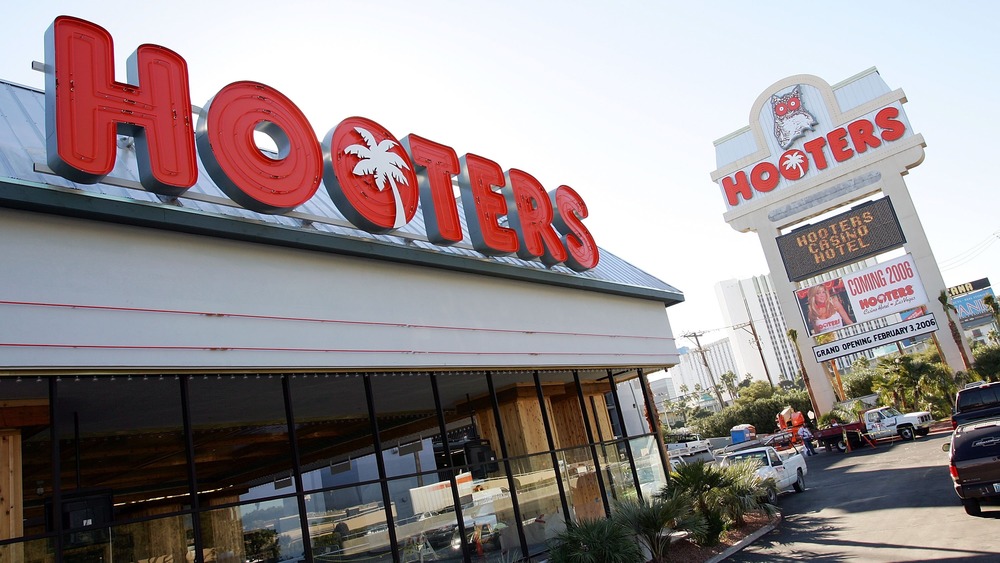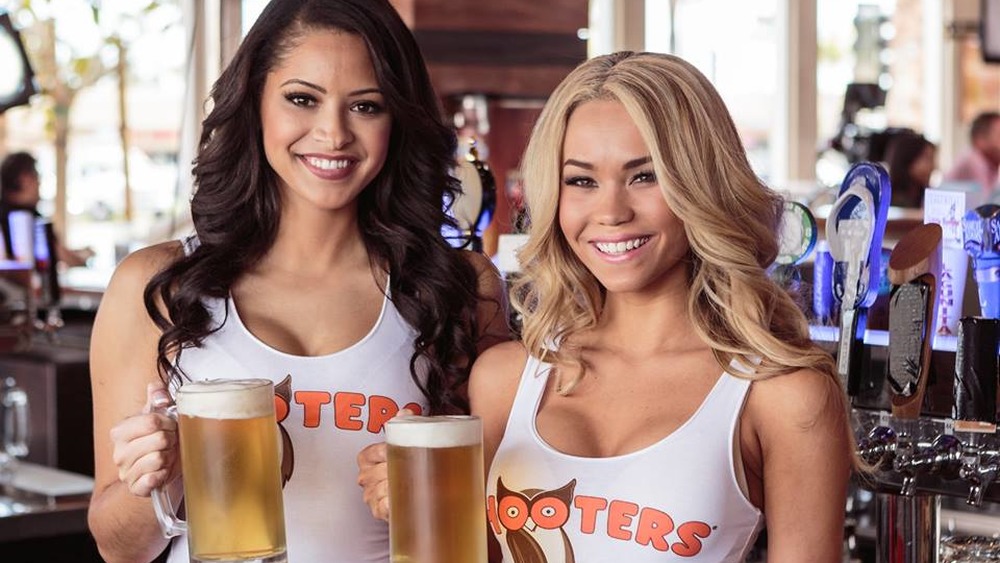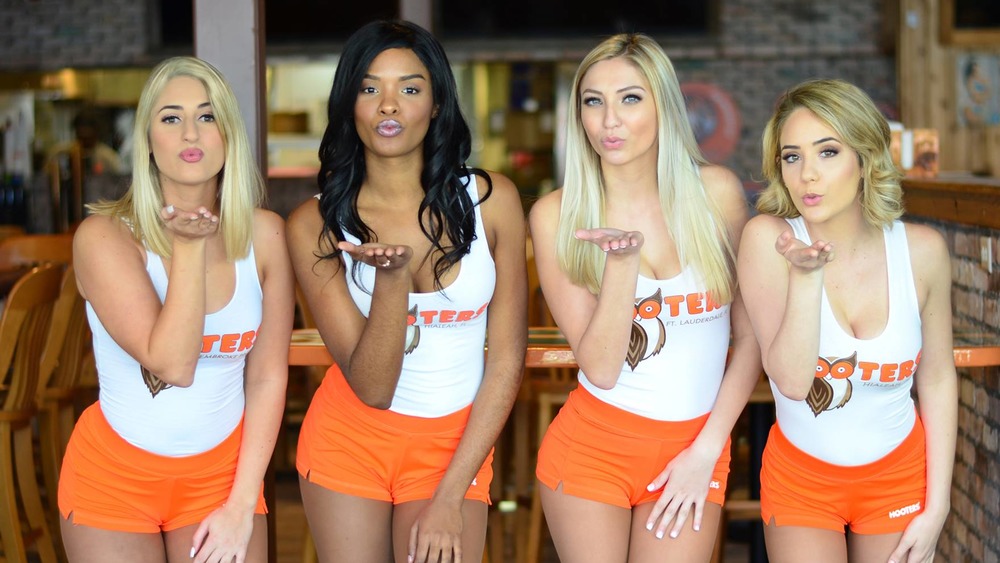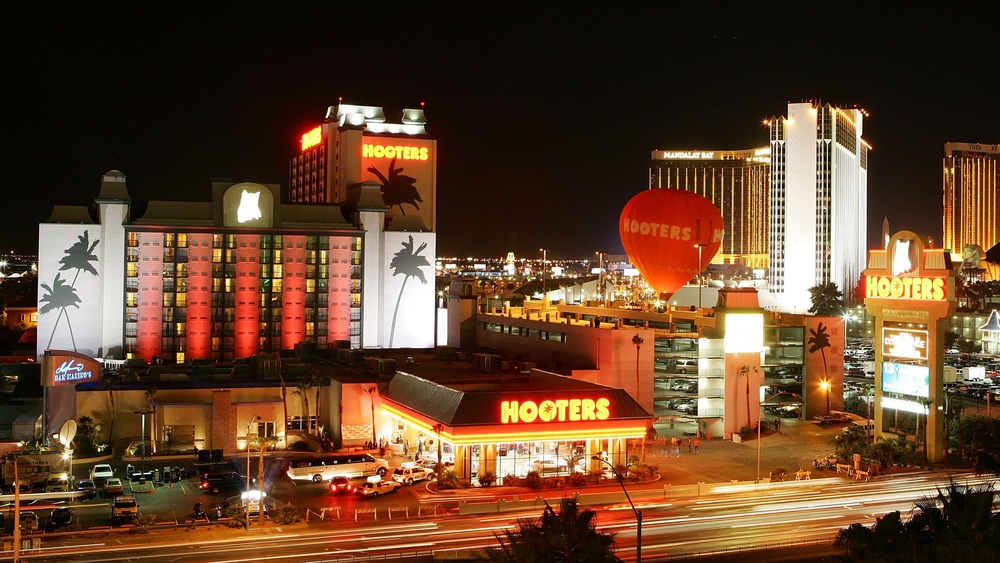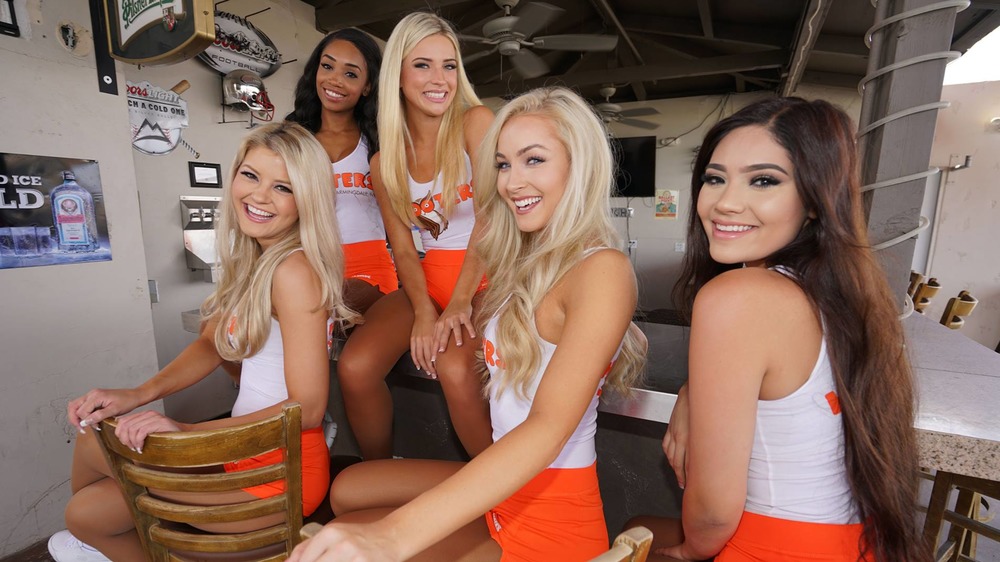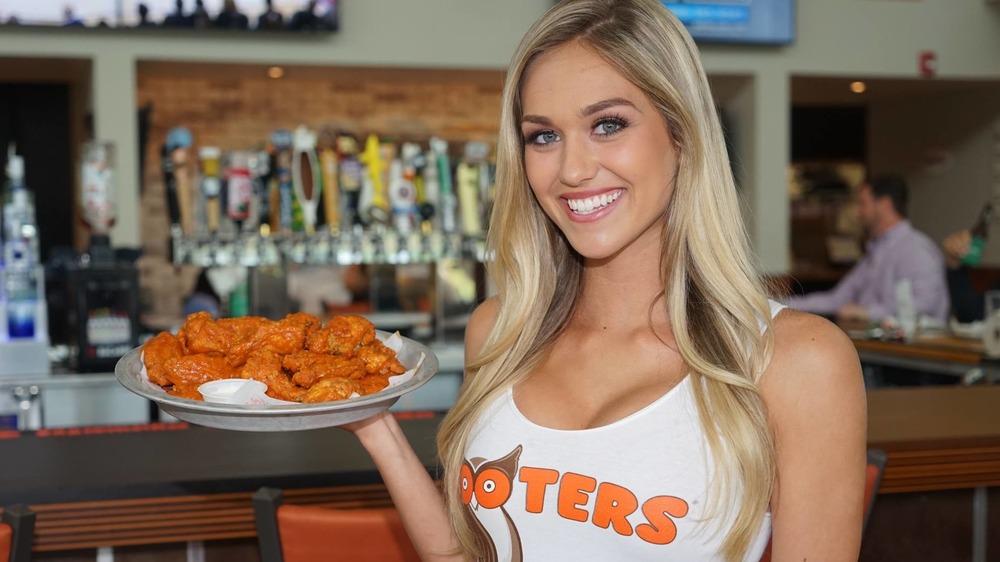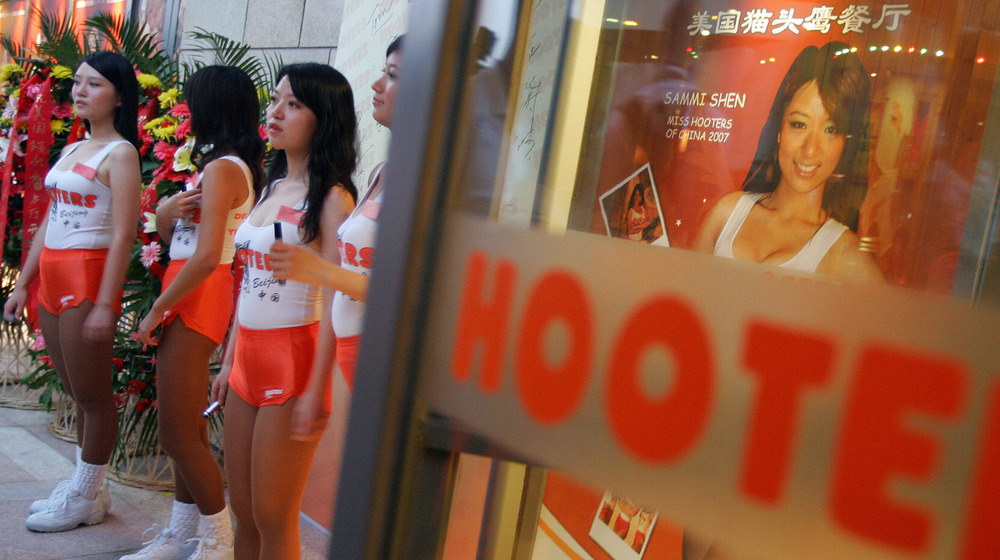The Real Reason Hooters Is Disappearing Across The Country
Usually, when you announce where you're headed for dinner, it's met with a bit of excitement and — hopefully — agreement. Announce to the family you'd like to go to Hooters, though, and it might be met with doubt and a disapproving scowl. There's no denying that Hooters — with their scantily-clad waitresses and looks-based hiring practices — has always targeted a certain client base.
It's hard to believe they've been doing it for more than 30 years, and according to USA Today, they haven't aged well. They called Hooters "a fading relic of the 1980s," and they've been on a very slow downward slide for a long time. There's only one year in recent memory that they saw a sales increase, and even then it was just a pretty sad one percent. In 2008, they had 400 restaurants. By 2011, they had closed 35 locations and lost an annual revenue of more than $100 million (via Time). Between 2012 and 2016 they closed a further seven percent of their locations, says Business Insider. So what's going on with this bro-centric breastaurant?
Both men and women are finding it offensive and uncomfortable
BrandIndex is a company that surveys a wide customer base across dozens of industries in order to determine what's trending and what's not. They took a hard look at Hooters in 2013, and what they found was pretty hilarious... or would be, if it wasn't so dismal. Customers were asked to rate Hooters on a numbered scale and the responses were pretty awful, both from women and from men.
Adding to the uncomfortable feeling people get from Hooters is the toll the work can take on the waitresses. In 2015, faculty from the University of Tennessee's psychology department set out to find what kind of consequences working in this environment had on waitress's mental health, and the findings were pretty disturbing (via The Conversation).
All the waitresses interviewed suffered from some degree of depression, anxiety, anger, confusion, and feelings of degradation. They also reported feeling demeaned on a regular basis. So if you've ever felt uncomfortable on behalf of the Hooters' girls, that might be why. Care for a side of awkwardness and degradation with those chicken wings? Didn't think so.
Those shirts just aren't as big a draw anymore
Hooters' original business strategy may have been to lure in the bros with, well, hooters, but some fascinating surveys suggest this tactic is failing for a weird reason: people just aren't feeling the need to oogle women's breasts at a "breastaurant" any more.
According to Business Insider, a meta-analysis from PornHub revealed some changing tastes in adult entertainment. When it came to the searches of people between 18 and 24 years old, they were the least likely to be looking for entertainment that was, well, breast-centric. Look at the age group that was between 55 and 64, and they're 17 percent more likely to be searching for breasts, but they're also not really the target market.
And they say that's a real problem for Hooters. The younger generation just isn't as impressed by women in low-cut shirts as their elders are, and when that's your schtick, it hurts your bottom line when it falls out of fashion.
Casual dining is out across the board
Hooters is one of a number of casual dining restaurants, and part of their struggles is a decline in the industry that's being felt by all their competitors. Chains like Applebee's and Outback Steakhouse are closing, too, and they all have something in common: millennials just don't like their style.
According to Business Insider, millennials in particular are abandoning casual dining restaurants in favor of fast-casual chains (like Chipotle), meal delivery services, and trendier new chains like wine bars. They're more focused on convenience and less likely to want to spend a few hours sitting in a restaurant, and that's impacting Hooters, too. In 2013, USA Today looked at how Hooters was trying to get more millennials in the door, and they started by overhauling locations with new technology, outdoor seating areas, and better AV systems for more sports.
That's great, but it hasn't had as much of an impact as they might like.
Their discrimination is completely legal
Today, headlines are dominated with movements to give women equal rights, equal pay, and equal opportunities... and that makes it really, really weird that Hooters is legally allowed to discriminate during their hiring processes.
Business Insider looked at why Hooters can get away with only hiring young, well-endowed women as servers. In 1997, two men sued the company after being turned away on the basis of their gender. Hooters settled (and settled a similar lawsuit in 2009) — but they were not forced to employ men as servers, based on some disturbing arguments. They claimed they weren't hiring waitresses, they were hiring "entertainers" who didn't interview as much as "audition." They did agree, however, to offer some gender-neutral positions.
They cited a footnote in the Civil Rights Act to justify their hiring practices, saying (via The Conversation) that having a smokin' hot body was a "bona-fide occupational qualification," so it wasn't discrimination to refuse to hire anyone who didn't have a specific set of... qualifications. Public opinion has matured enough that a lot of people will just choose a normal restaurant to eat at.
They were slow to update the food
Remember when people used to defend their choice to go to Hooters? It wasn't about the girls, they would say, it was for the food. They had good food, right? You've probably heard people singing the praises of their wings, and while that might have gotten them by in the 1980s and '90s, we have higher expectations now.
When Hooters got their 30th-anniversary overhaul, USA Today reported they were finally giving their menu an update, too. It wasn't until then that they brought in a new chef with some actual fine dining experience, and he wasn't impressed with how they had been doing things. Chef Gregg Brickman told one reporter that when he arrived, the most important tool in a Hooters' kitchen was "a scissors — to open a bag." Yikes.
Those wings? Frozen. The burgers? Frozen. You get the idea. In an era of social media and celebrity chefs, people just want to get more than that for their hard-earned dollars, and Hooters spent far too long coasting on the idea that people were really actually going there just for the food. Honest.
Boycotts and protests
Do you know what's not good for any company's image? People staging protests and picketing your plans to open new locations.
That's exactly what happened when Hooters announced they were expanding in the UK. In 2010, protesters started campaigning against the imminent opening of a Hooters in Cardiff, with one spokesperson saying (via The Guardian), "Everyone should have a job but they should be good jobs with dignity. Not only is it a sexist institution, but it encourages a sexist culture." (In spite of protests, The Guardian also reported the chain opened there a few months later.)
Wales wasn't the only country to protest Hooters, and in 2010 Marks & Spencer was threatened with boycott when a Bristol location announced they would sublet space to Hooters (via The Telegraph). A Birmingham location was only open for a year before closing, and Sheffield's Hooters got such strong opposition that it never even opened. The Independent called it "the feminist nightmare" when they reported on Scotland's condemnation of the chain as a "degrading spectacle" in 2008, saying that people from government officials to students weren't happy about the idea of getting one in their town.
